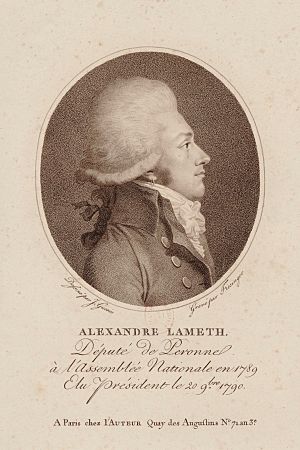Alexandre-Théodore-Victor, comte de Lameth facts for kids
Quick facts for kids
Alexandre-Théodore-Victor Lameth
|
|
|---|---|
 |
|
| Born | 20 October 1760 |
| Died | March 18, 1829 (aged 68) |
| Title | Count |
| Relatives | Charles Malo François Lameth (brother) Théodore de Lameth (brother) |
Alexandre-Théodore-Victor, comte de Lameth (born October 20, 1760 – died March 18, 1829) was an important French soldier and politician. He lived during a very exciting time in French history, especially during the French Revolution. He was known for his efforts to bring about change and his belief in a fair government.
Contents
A French Leader
Early Life and Military Service
Alexandre Lameth was born in Paris, France, on October 20, 1760. He was the youngest of three brothers. His mother was Marie Thérèse de Broglie. His uncle was the famous Maréchal de Broglie.
Alexandre had two older brothers. Théodore Lameth also served in the American war. He later became a general. His other brother, Charles Malo François Lameth, was a popular politician. He was also a hero of the American Revolutionary War.
Alexandre himself fought in the American Revolutionary War. He was a colonel in the Royal Lorraine Regiment. He served under a French general named Rochambeau. Like his brother Charles, Alexandre was a Knight of the Order of Malta.
Friendships and Political Ideas
Many soldiers who fought in the American Revolutionary War became friends. Alexandre Lameth became friends with Thomas Jefferson. Jefferson later became the third President of the United States. Lameth believed in moderate changes for France. He wanted a government with a strong, single law-making body. Jefferson respected these ideas.
American newspapers even printed Lameth's speeches. These speeches were from the French National Assembly. He spoke about important topics like private property. He also discussed the Civil Constitution of the Clergy. Alexandre-Théodore-Victor was also a member of the Society of the Cincinnati. This was a group for officers who fought in the American Revolution.
A Voice for Change
In September 1789, Alexandre Lameth joined forces with two other politicians. Their names were Adrien Duport and Barnave. They formed a group known as the "Triumvirate." This group worked together during the early days of the French Revolution. They became close friends.
In the Constituent Assembly, this group led about forty other politicians. They were on the more progressive side of the Assembly. Lameth gave an important speech on February 28, 1791. He spoke at the Jacobin Club. He spoke against Honoré Mirabeau. Mirabeau was a powerful speaker. People were starting to suspect Mirabeau was secretly working with the King.
Later, Lameth and his friends led the Feuillant club. They believed the King's attempt to flee the country was a big problem. They thought it showed the revolution was going too far. They wanted to find a middle ground. They hoped to end the war quickly. They also wanted to keep the good changes from the revolution. Their main goal was to pass a new Constitution. However, the revolution became more extreme. This made their hopes for moderate changes difficult.
Challenges and Later Life
Alexandre Lameth continued to serve in the army. He was a general under Nicolas Luckner and the Marquis de la Fayette. However, he was accused of treason on August 12, 1792. This happened because he protested against the Attack on the Tuileries.
He had to flee France. He and other former members of the Constituent Assembly were captured by Austria. They were held in prison for seven years.
After his release, he started a business in Hamburg. He worked with his brother Charles. He did not return to France until the French Consulate period. This was after the French Revolution.
Under the rule of Napoleon Bonaparte, he became a prefect. A prefect is a high-ranking government official. He served in several different areas. In 1810, he was given the title Baron of the Empire.
After Napoleon, the Bourbon family returned to power. Lameth supported them. He was appointed prefect of Somme. He also became a representative for Seine-Maritime and then Seine-et-Oise. In these roles, he became a leader of the Liberal opposition. This group wanted more freedom and change.
His Writings
Alexandre Lameth wrote several books and articles. Two of his most important works are Histoire de l'Assemblée constituante and Mémoires. In Histoire de l'Assemblée constituante, he wanted to write an accurate history. He did not want to just share his own biased stories. He wanted to give a detailed description of the work done by the Constituent Assembly. He was in a good position to remember the most important events.
 | May Edward Chinn |
 | Rebecca Cole |
 | Alexa Canady |
 | Dorothy Lavinia Brown |

